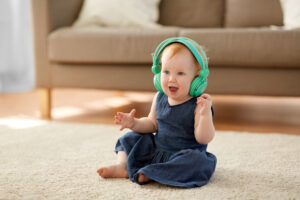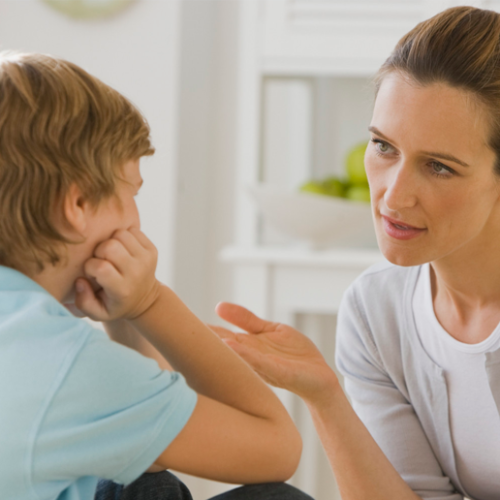How hearing develops in babies
 Hearing is a key marker when it comes to how your baby is progressing. By keeping track of milestones, protecting their ears and introducing them to new sounds, you can help your little one flourish.
Hearing is a key marker when it comes to how your baby is progressing. By keeping track of milestones, protecting their ears and introducing them to new sounds, you can help your little one flourish.
As one of the five primary senses, hearing is a fundamental part of your baby’s development. Through their ears, your little one will experience a plethora of sounds which translate into information about their environment. It’s necessary to keep track of the progress of your baby’s hearing to make sure that they’re developing properly and that there aren’t any issues to be concerned about.
Auditory milestones
While there are lots of aspects of parenting that can feel scary and unknown, developmental milestones offer a way to track your little one’s progress and to see if they are hitting the correct markers at approximately the right time.
Newborns
From the moment they’re born, babies are using their sense of hearing to understand and engage with the world around them. In fact, before they’re born, little ones can hear certain things from within the womb, including their parents’ voices. Of course, they won’t immediately be able to understand what all of these sounds mean. You’ll notice how they react to various noises that they experience through their facial expressions and any responses they make. They may become accustomed to your voice and be soothed by it. It’s worth remembering that, just because they can’t talk to you yet, it doesn’t mean that they aren’t listening to and communicating with you. So make sure to chat away to your little one as much as possible – they are soaking all of your words in and learning constantly.
Approaching two months
Once your baby is around two months old, they will probably begin trying to make and repeat sounds. This is a great sign as they are practising the building blocks of speech while discovering the sound of their own voice. Your little bundle of joy may begin to respond more to the sound of your voice, and you’ll notice them go quiet as they listen attentively.
Four to six months
As babies reach six months of age (how quickly time flies!) they will start to investigate where all the fantastic sounds they hear are coming from. This is a great chance to introduce them to toys that create noise, such as rattles and rainmakers. Babies will spend lots of time shaking these in different ways, learning all the time. Songs, nursery rhymes and simple conversations will help your baby to further develop their hearing.
Seven to twelve months
Coming up to their first birthday, babies will begin to copy the sounds that their parents make. They can make a wider variety of sounds and might even be able to understand some of the context of what you are showing them. For example, if you are holding their toy and talking about it, they’ll begin to understand that the noises you are making relate to the object in your hand. These may seem like small things but they’re huge steps in your child’s developmental journey. After the magical first birthday, babies can often mimic words such as ‘mama’ or ‘dada’, and are able to wave goodbye. Not only is it absolutely adorable, it’s a wonderful sign that your little one is right on track!
All children are different and the rates of development are as unique as your special little one. So don’t worry if your baby reaches these stages at a slightly different time. However, if you are truly concerned, reach out to your family doctor for advice.
Boosting hearing development
There is no secret to helping your baby develop their hearing. Nearly every waking moment, they are listening keenly to their surroundings, and often trying to make sounds of their own. While baby talk is adorable, it’s important to speak to your little one clearly and using complete words. Some parents think that this is unnecessary, or that normal speech is far too complex for babies to understand.
Conversation is key
The truth is that by speaking properly, you are introducing your child to so many different sounds. Their brains will try to absorb these sounds and in time, your baby will try to replicate aspects of the words they hear. To an observer it may look like they’re simply repeating the same noise over and over again, but they are often practising making the sound of a word or even a syllable that they’ve overheard.
Sounds in the wild
Similarly, babies are usually fascinated with their environment. Whether it’s buzzing insects, barking dogs, rumbling cars or whooshing aeroplanes, little ones are taking it all in. They may point excitedly and perform their own rendition of the sound that the plane makes as it passes overhead. Engage with your child as they try to make these sounds and feel free to get involved!
Hitting the high notes
Music is a real treat for babies. As with conversation, they’ll try to absorb all of the harmonies and their minds will light up from the seemingly infinite array of patterns that songs can produce. Regularly play music to your little one and have family sing-a-longs to introduce them to the wonderful world of music and the variety of sounds it has to offer.
A bedtime story
Bedtime stories are a key part of a healthy evening routine for little ones. Not only do they signal that it’s almost time to sleep, they provide a relaxing few moments for your baby to listen to the sounds your voice makes as you read each word.
Mind their ears
A young child’s ears are very sensitive. Their ear canal is much smaller than an adults and, as a result, the pressure experienced from a sound is much greater than for us grown-ups. In other words, noises are louder for young children than they are for us. We need to be careful with our little ones’ ear health.
Noise-cancelling headphones
From concerts or sporting events, to busy shopping malls or family celebrations, babies sometimes have to attend occasions that have unavoidable high volume levels. Noise-cancelling headphones, or earmuffs, act as a buffer from this noise, meaning that your child can engage in the festivities without damaging their ears.
Volume control
Many kids’ toys and apps create loud noises to capture their attention. It’s important that we monitor how loud these devices are, or even mute them if necessary. Remember, young children are still exploring the world of sound and may interact with it differently than we would. For example, they might hold the noisy toy right up to their ear to examine it more closely. It’s experiences like this that can damage hearing, so keep a close eye (and ear!) on your baby when they’re exploring sounds in this way.
Set a good example
As with many aspects of parenting, it’s down to us to set a good example for our children to follow. ‘Do what I say, not what I do’, is a confusing rule for most and as such, we must endeavour to mind our own hearing health. Try to keep the TV volume at a lower level, avoid blasting music too loudly and wear ear protection if using any tools or machinery while carrying out home maintenance. If your baby sees you minding your own ears, they won’t have an issue minding theirs.
One last note
Hearing is a beautiful gift that most of us take for granted. If you have any concerns around your baby’s ability to hear, don’t hesitate to contact their doctor for a consultation. Helping your child to blossom doesn’t have to be all hard work. Have fun with it and enjoy the miraculous milestones as your baby’s hearing develops fully.
Image Credit: Shutterstock











Comments